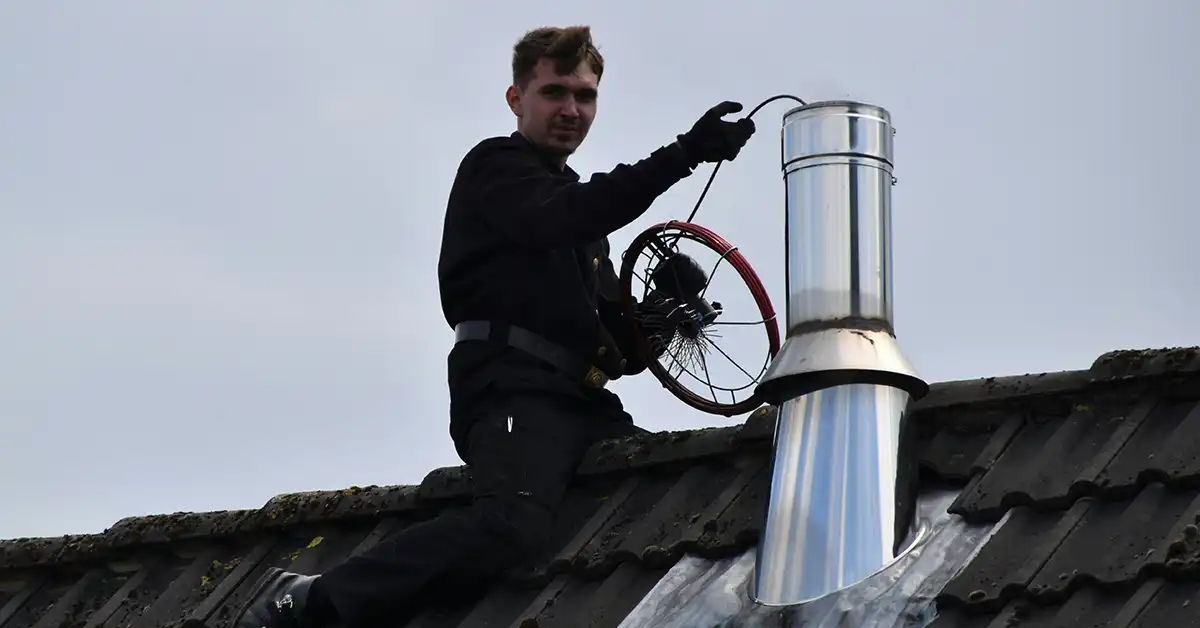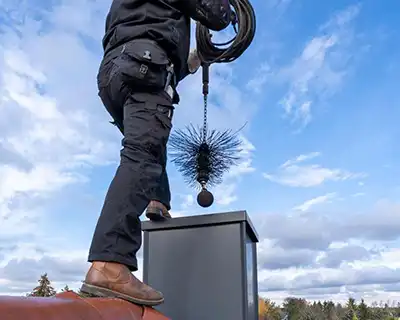
Becoming a chimney sweep is more than just learning to clean soot and ash. Understanding the science of chimneys, the art of maintenance, and the importance of safety is essential.
In this article, we delve into the credentials needed to become a professional chimney sweep. We will look at the certifications, training, and skills that separate amateurs from professionals. You will find verified information and useful tips to help you.
If you are thinking about a career in this field or starting a chimney sweep business, this guide is for you.
The Role and Importance of a Chimney Sweep
A chimney sweep plays a crucial role in maintaining fire safety. Their work involves cleaning chimneys, flues, and vents to prevent dangerous build-ups of soot and creosote. These substances, if left unchecked, can lead to chimney fires, carbon monoxide poisoning, and other serious hazards.
However, the role of a chimney sweep extends beyond mere cleaning. They are also responsible for:
- Inspecting chimneys for structural integrity and safety.
- Identifying and repairing faults or damages.
- Advising homeowners on proper chimney use and maintenance.
- Ensuring compliance with fire safety standards and regulations.
A professional chimney sweep keeps homes safe. They specialize in fire prevention and know a lot about chimney health.
Historical Context of Chimney Sweeping
Chimney sweeping has a long and storied history. In the 18th and 19th centuries, it was a job often performed by young boys because of their small size. This practice, however, was fraught with danger and exploitation, leading to its eventual abolition.
Today, chimney sweeping is a respected profession regulated by industry standards and requiring specific qualifications. Modern chimney sweeps use advanced techniques, tools and chimney sweep software, ensuring safety and efficiency in their work.

Essential Qualifications for Chimney Sweeps
Becoming a chimney sweep requires a combination of technical knowledge, physical capability, and customer service skills.
Key Qualifications:
- Fire Safety Knowledge:
- Understanding of chimney functionality, common fire hazards, and prevention methods.
- Awareness of the National Fire Protection Association (NFPA) guidelines.
- Technical Skills:
- Familiar with different types of chimneys and ventilation systems.
- Hands-on experience with the best chimney tools and diagnostic equipment.
- Physical Fitness:
- Ability to work at heights and in confined spaces.
- Customer Service Skills:
- Strong communication to advise homeowners and build trust.
- Business Acumen:
- Marketing, financial management, and regulatory knowledge for business owners.
- Professional Ethics:
- Adherence to safety standards and continuous learning.
Certification: The Path to Professionalism
Obtaining certification is crucial for establishing credibility and ensuring compliance with safety standards. Some of the most recognized certifications include:
Chimney Safety Institute of America (CSIA) Certification
- Overview: The CSIA certification is one of the most respected credentials in the industry.
- Requirements: Passing an exam covering chimney and venting systems based on NFPA codes.
- Continuing Education: Certified sweeps must earn Continuing Education Units (CEUs) to maintain their certification.
- More information: CSIA Official Website
National Chimney Sweep Guild (NCSG) Membership
- Overview: While not a certification, NCSG membership demonstrates a commitment to high industry standards.
- Benefits: Access to training, industry updates, and networking opportunities.
- More information: NCSG Official Website
Training and Apprenticeships
Practical experience is essential to becoming a skilled chimney sweep. Many professionals begin their careers through apprenticeships, gaining hands-on experience under the guidance of experienced sweeps.
Steps to Get Started
- Find an accredited training program.
- Complete an apprenticeship with an experienced professional.
- Attend workshops and industry events for continuous learning.
Understanding Codes and Standards
Chimney sweeps must follow industry codes and standards. Groups like the NFPA set these. This helps ensure safety and professionalism.
- Key Standards to Follow:
- NFPA 211: Standards for Chimneys, Fireplaces, Vents, and Solid Fuel-Burning Appliances.
- Occupational Safety and Health Administration (OSHA) guidelines.
Insurance and Bonding for Chimney Sweeps
Insurance and bonding are critical aspects of running a chimney sweep business. These protect both the professional and the homeowner in case of accidents or damage.
- Types of Coverage:
- General liability insurance.
- Workers compensation insurance.
- Bonding for financial protection.
Skills Beyond the Brush: Customer Service and Business Acumen
Providing excellent service extends beyond technical skills. A professional chimney sweep must excel in:
- Customer Relations: Explaining procedures and maintenance tips to homeowners.
- Business Management: Handling marketing, scheduling, and financial operations effectively.
Conclusion: Building a Trustworthy Reputation
Becoming a professional chimney sweep requires a blend of technical expertise, safety awareness, and customer service skills. To become a skilled professional in this trade, you need the right qualifications and certifications. Hands-on experience is also important. With these, you can gain trust in your field.
For more information, check trusted sources like the Chimney Safety Institute of America and the National Chimney Sweep Guild.
